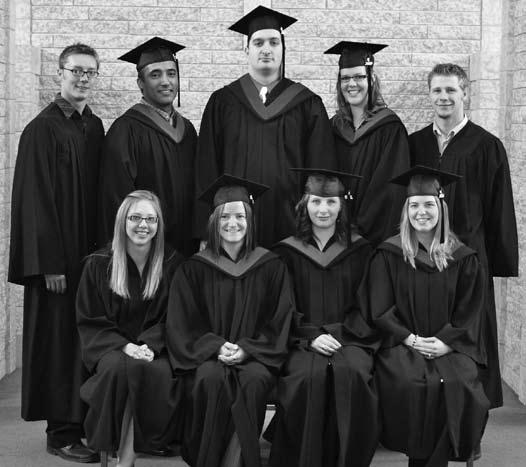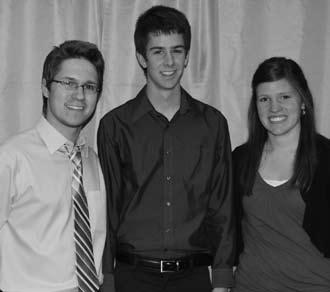
7 minute read
Archives alcove
In 1834 Peter von Riesen translated some writings of Menno Simons from Dutch into German and published them. German Mennonite leaders in Prussia (now Poland) confiscated them.
The translator, who obeyed the confiscation order or be excommunicated, struggled with “whether we had done right by surrendering up these books so obligingly.”
Why were Menno Simons’ writings seized? Abraham Friesen, a KG (now (now Ukraine), said most German Mennonites in Prussia no longer practiced Simons’ teachings and “were afraid and ashamed to have these writings come to light” (Delbert Plett).
Whether or not Friesen’s view was accurate, there was a fear that other Christians would read them and “thereby acquire a hatred of the Mennonites” (Peter Toews). A Lutheran farmer in Prussia was “displeased” after reading how Menno Simons defended himself in the 16 th century to Reformed and Lutheran leaders. German Mennonite leaders were concerned others would respond similarly, which could affect the church’s shaky legal standing in Prussia.
During the 1834-1835 controversy, one German Mennonite minister was quoted as saying he was dissatisfied with Menno’s writings, had never read them, and would avoid them in the future.
Menno was silenced in some churches that identified themselves by his name. If this seems strange, issues underlying this dispute still exist centuries later.
First, in recent Roman Catholic-Mennonite World Conference discussions (1998- 2003), leaders grappled with the
Reformation’s polemical writings. With all due respect to Menno, I have wondered how wise some of
EMC) minister in Russia
his wordings were even in the 16 th century.
Second, if it is paradoxical that an Anabaptist minister would be blindly for or against Menno without reading his work, how many current EMC ministers have Menno’s Complete Writings, check for his opinion, and refer to it occasionally? (Menno himself was concerned that we test his teaching by the Word of God and that our focus be on Jesus.)
Third, years ago Peter Toews pointed out the irony that in 1835 Mennonite leaders in Prussia confiscated Menno’s writings and then in 1860 wanted to construct both a monument and a college in his honour (for all of this story, see Delbert Plett, Golden Years, 321-324).
Jesus was critical both of those who stone prophets and those who later put up monuments to the prophets without changing their lifestyle (Luke 11:47). Neither confiscation nor glorification honours Menno Simons. Confiscation, however, at least cares
enough to respond to what Menno wrote; indifference does not.
After the confiscation, Menno’s writings translated into German were allowed to be shipped to Russia; they were sought by KG (now EMC) members and brought by them to Canada. How many EMC homes today contain the writings of Menno Simons in English?
Even when we disagree with Menno, we need to move beyond being embarrassed by him. This Dutch former priest, a steady leader during the Radical Reformation, deserves our respect.
Finally, in various ways Menno’s writings can still get us into trouble today—if we dare be bold.
Thoughts on the Nurturing Healthy Sexuality Conference
In life there are some conversations that are difficult. As Christians we have a responsibility to use the Difficult conversations include situations where we scriptures as our foundation for the way we live our need to confront someone, times of disappointment, lives; this is true not just for sexuality but also for or discussing sensitive issues. When you do set out how we interact with people, run our businesses and to have a difficult conversation you have certain live out our everyday lives. hopes and goals ahead of time about the way it is We were disappointed that the workshop pregoing to go, and sometimes it does go that way and sentations were not better informed by biblical and other times it does not. ethical considerations. However, we recognize that
In late 2008 the Mennonite this conference was a starting Central Committee (MCC) began point for conversation on an planning for the Nurturing We found that the workshops issue that is often awkward and Healthy Sexuality (NHS) conthat we did attend were neglected by the church. ference that would be held in February of 2010. As the initial lacking engagement with the Now it is our responsibility to continue the conversation plans were being discussed there scriptures in the discussion. perhaps beginning at the local was a call for sponsors for the level. We can do this in Bible conference. study groups, youth and adult
MCC’s Voices for Non-Violence was the organizing Sunday school classes and thereby do better with the committee and invited a number of other Christian next generation in terms of open discussion on what organizations and Mennonite Conferences to be we believe healthy sexuality should look like. involved. After attending the early meetings and We are created to be sexual beings and so it is hearing about the direction of the conference, the important that the church does some teaching on Board of Leadership and Outreach felt comfortable healthy sexuality. There were two themes that we in being a sponsor, believing that this was a converheard clearly at the conference. First, that churches sation whose time had come. need to say more to young people about sexuality
At the NHS conference there were two plenary than merely prescribing sexual boundaries. Second, sessions and two workshops to attend. There were that the church needs to acknowledge that singles five different workshops to choose from on a variety are sexual beings, not just sexual beings in waiting. of subjects in the area of sexuality. Since we did not What could this look like within a biblical, healthy attend all of the workshops that were offered we approach to sexuality? cannot respond to all of them. Let’s continue the conversation, looking to the
We found that the workshops that we did attend scriptures for direction and our foundation. We need were lacking engagement with the scriptures in the to give biblical guidelines for healthy sexuality, to discussion. The workshops relied on the personal our children, our youth, as well as adults of all ages. experiences and stories of those on the panel and David Thiessen with that led those in attendance in a certain Layton Friesen direction of thinking. We heard heartfelt accounts Kimberly Stoesz of difficulties those on the panel had experienced regarding their sexuality. The lack of biblical direcEditor’s note: All the writers are connected with tion was especially evident in the Sex, Sexuality, the EMC Board of Leadership and Outreach. The Sexual Orientation and (Com)Passion and Sex and the NHS conference was held at Canadian Mennonite Holy City workshops. University on Feb. 6, 2010.
30 graduate at SBC
STEINBACH, Man.—Thirty students received their diplomas at Steinbach Bible College’s graduation ceremonies held at Steinbach EMC on Sunday, April 25, 2010.
Among the graduates were 26 Bachelor of Arts recipients. This marks the largest graduating class in the past five years.
The ceremonies were highlighted by the valedictorian address delivered by Nicole Friesen and the undergrad response given by Steven Brandt.
The commencement address was brought by Tim Houck, speaker and trainer with Truth Matters Ministries. He challenged the graduates to take a step of faith and follow God into ministry opportunities.
Ignite!, one of the ministry teams of the college, performed several songs and spoke of the message of hope and peace that come from faith in God.
This wraps up an exciting weekend that started with the
Valedictorian Nicole Friesen receives her diploma from Dr. Rob Reimer, SBC’s president.
Spring Concert on Friday night, followed by the Grad Banquet which was held on Saturday night. This concludes a strong year of study at Steinbach Bible College.
The faculty and staff look forward to spending some time recharging and preparing for another year in September. Remember to pray for our graduates as they leave the familiar surroundings of SBC and venture into the careers and ministries that God has prepared for them. Patrick Friesen Director of Communications
EMC graduates: (back) Andrew Buhler (Pineridge Fellowship Chapel), Diploma of Biblical Studies; Antonio Pitta (Ebenezer Church), BA Pastoral; Miles Neufeld (Kola), BA Youth; Carleen Plett (Heartland Community Church), BA Christian Studies; Willie Wall (Picture Butte), Diploma of Biblical Studies; (front) Allison Friesen (Kola), Diploma of Biblical Studies; Tracee Plett (Ridgewood), BA Peer Counseling; Diana Peters (Mount Salem), BA Christian Studies; Landis Krahn (Picture Butte), BA Peer Counseling.

Providence Theological Seminary
TS Y P S E T UR CO
HOTOS P
Left, Gerald D. Reimer (EFC Steinbach) Master of Arts, Educational Studies; right, Darryl G. Klassen (Kleefeld EMC) Master of Arts, Christian Studies
Esau tours with Bethany College
HEPBURN, Sask.—Benjamin Esau (Abbeydale) is part of Bethany College’s music ministry team Point of Impact that tours Saskatchewan and Manitoba. Each year the team memorizes a portion of scripture, which, when mixed with powerful music, assists a congregation in encountering Christ.
Ben performed with the team at Bethany College’s annual Youth Advance. At Youth Advance both David Zentner (also Abbeydale) and Ben performed with their band called BCBU. Bethany College
LLEGE CO ANY TH Y BE S E T UR CO

HOTOS P








